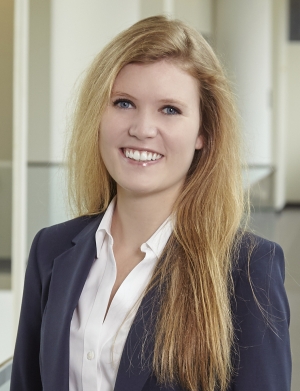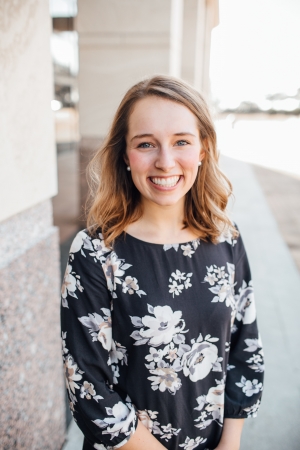IT ALL DEPENDS
Alas, ethics implies an inevitable right-or-wrong answer can be found. That may be true in honoring a commitment or carving out a middle ground in a dispute. When it comes to practicing business, the “right thing” is often an exercise in uncertainty.
Just ask Margaret Shull, a finance major and McKinsey hire from Case Western Reserve. Despite working in a “quant” field where numbers should naturally add up, she learned that there is no “right” answer. “Your forecast could be reasonable, but the person sitting next to you could have a completely different yet equally valid conclusion,” she points out.
To counter that, the University of Pittsburgh’s Maximillian Kneis adopted an important new phrase: “It depends.” Turns out, it represents far more than a dodgy, snippy reply. “There are always so many factors at play. While classes can teach you frameworks and strategies to tackle business problems, every single situation is different. It’s hard to ever know the exact best answer to a situation in the business world, which can be a little bit frustrating to an analytical thinker who wants to find the “right” answer.”
Frustrating as ambiguity can be, it does come a caveat, says Washington University’s Sara Miller. “Every time I have taken a new course, I have left with many more questions than answers. The more I learn, the more I want to know.”
SUCCESS IS HARDLY GUARANTEED
Uncertainty has always dogged decision-making. In the military, it is called the “fog of war” – the constantly changing situation on the ground. Here, positions and resources are constantly shifting – all as leadership works feverishly to decode their adversary’s strategy – which is too under constant alteration. Georgia Tech’s Evie Owens compares business to something similar – poker – a game that also involves intensive deception, re-assessment, and risk-taking.
“You don’t always know what your competitor’s hand might hold, but you have to put on your best game face and analyze your options to be able to make the best decision for your company.”
In other words, success is never guaranteed. That’s because it is hard to reduce any organization or effort into “one-size-fits-all,” says Notre Dame’s Katie Eilert. Worse, she isn’t afraid to speak a truth that few leaders want to hear: no one really knows what they doing!
“Failure breeds success, and just like business leaders from Mark Cuban to Bill Gates, you will probably fail big at some point. This idea of business as basically an educated trial-and-error is terrifying but also kind of refreshing, and it means that you are constantly learning and improving.”
DATA OBSOLETE IN 2 YEARS
That creates a certain complexity in managing a business. Brianna Riggs, for example, was surprised by the varying organizational strategies she absorbed during classes at Lehigh University – ones intertwined at the functional, business, and corporate levels of strategy. Such discoveries tipped the 2018 Class off to something crucial: business can’t studied in silos. Everything is connected; a marketing solution may require elements from disciplines as disparate as finance and operations.
“Business is like a salad, asserts Ariel Toy, an economics major from the College of New Jersey. “Economics, Finance, Accounting, Management, and Marketing are the ingredients. You can’t enjoy the salad unless you have a bit of everything, just like you can’t learn a lot from business without knowing each discipline.”
More than that, the pace of business has accelerated. This hit home for the University of Pittsburgh’s Rachael White, who witnessed this first-hand during her four years. “Some courses I took focused more on using current event stories over textbooks because professors insisted that, by the time the textbooks were published and used in the classroom, the data used was obsolete because it was at least two or three years old and no longer relevant.”
YOUR LEARNING ONLY STARTS IN THE CLASSROOM
Perhaps the biggest surprise for the Class of 2018 involved the traditional learning structure – where the classroom served as the main source of knowledge. Turns out, it was often the inverse for the Best & Brightest business majors. Katie Wellman was struck by an age-old dilemma in academia: the “stark difference” between what students learn in class and how business is really practice. “An academic viewpoint taken by professors is not always how it works in the real world,” she admits.
Even in school, the classes don’t always leave the deepest impressions. At Cornell University, Kayti Stanley says what happens in “field trips, hackathons, or networking panels” matters just as much as the classroom. It was a surprise that re-shape the experience of the University of Illinois’ Rachel Jacoby.
“I entered college assuming that most of my knowledge would come from my business courses, but my experiences outside the classroom, have been just as, if not more, impactful,” she says. Whether it was leading the first green business organization on campus, helping to start a chicken farm business in Honduras, or participating in an entrepreneurship workshop in Kuala Lumpur, some of my most memorable college experiences have not occurred in the classroom.”
DON’T MISS:
The Best & Brightest Business Majors – Class of 2018














Questions about this article? Email us or leave a comment below.